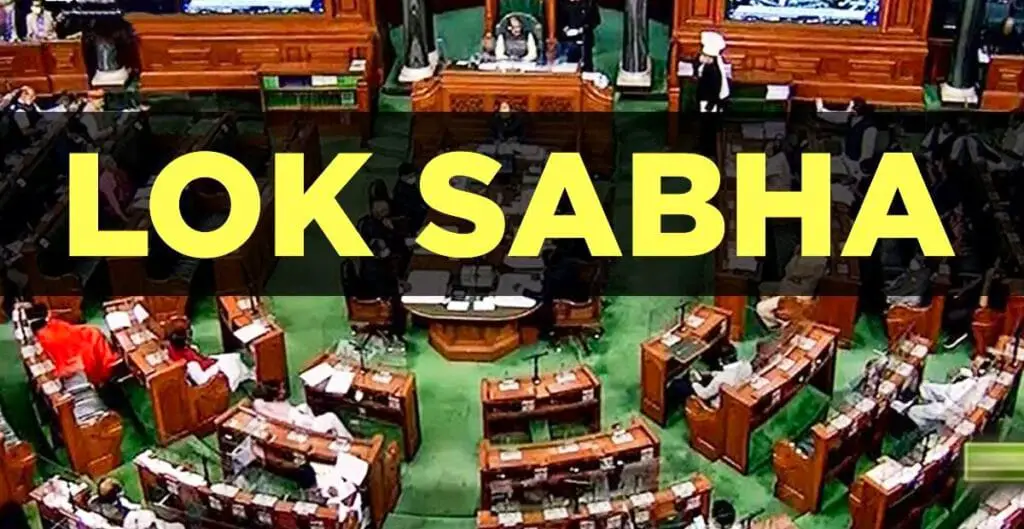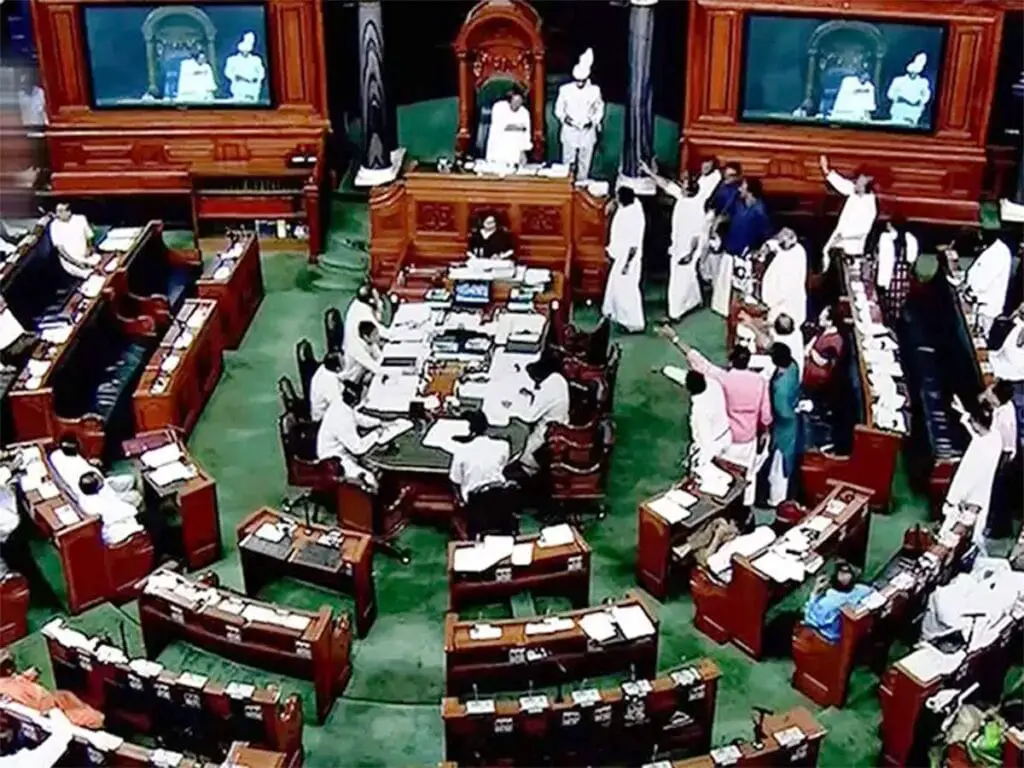
The Lok Sabha or the House of the People is the lower house of the Parliament of India. As the directly elected body representing the people of India, the Lok Sabha holds significant power in the country’s parliamentary democracy. It plays a key role in shaping laws, controlling the government, and ensuring accountability through its various functions.
Composition of Lok Sabha :
The composition of the Lok Sabha reflects the democratic character of India, where members are elected by the people to represent them.
- Membership:
- The maximum strength of the Lok Sabha is 552 members.
- 530 members represent the states.
- 20 members represent the Union Territories.
- 2 members can be nominated by the President from the Anglo-Indian community (this provision was abolished by the 104th Constitutional Amendment Act, 2019).
- Currently, the total number of seats is 543, all of which are filled through direct elections.
- The maximum strength of the Lok Sabha is 552 members.
- Election Process:
- Members of the Lok Sabha are directly elected by citizens of India through universal adult suffrage. Elections are held using the first-past-the-post system, where the candidate with the most votes in each constituency wins.
- India is divided into 543 constituencies, with each constituency electing one representative. The distribution of seats is based on the population of the states and Union Territories.
- Term:
- The Lok Sabha is elected for a term of five years. However, it can be dissolved earlier by the President on the recommendation of the Council of Ministers. It can also be extended during a national emergency for a period of one year at a time.
- Presiding Officer:
- The Lok Sabha is presided over by the Speaker, who is elected by the members of the house. The Deputy Speaker, also elected from among the members, presides in the absence of the Speaker.
- The Speaker plays a crucial role in maintaining discipline and order in the house, ensuring that debates are conducted fairly and according to parliamentary rules.

Powers and Functions of the Lok Sabha :
The Lok Sabha is the most powerful house of Parliament, with significant responsibilities in the legislative process, executive control, financial oversight, and amending the Constitution. Its functions can be broadly categorized into legislative, financial, executive, electoral, judicial, and deliberative functions.
1. Legislative Functions:
- The primary function of the Lok Sabha is to make laws. It can legislate on subjects in the Union List, Concurrent List, and, under certain circumstances, on matters in the State List.
- Bills can be introduced in either the Lok Sabha or Rajya Sabha, except for Money Bills, which can only originate in the Lok Sabha.
- After a bill is passed by the Lok Sabha, it moves to the Rajya Sabha for approval. If both houses pass the bill, it is sent to the President for assent to become law.
Types of Bills handled in the Lok Sabha:
- Ordinary Bills: These deal with matters other than finance.
- Money Bills: These deal with matters of taxation, borrowing of money, and government expenditure.
- Financial Bills: Bills that involve expenditure but are not classified as Money Bills.
- Constitutional Amendment Bills: Bills to amend the Constitution.
- Private Member Bills: Bills introduced by members who are not ministers.
In case of disagreement between the two houses on an ordinary bill, the President can summon a joint sitting to resolve the deadlock, which is chaired by the Speaker of the Lok Sabha.
2. Financial Powers:
- The Lok Sabha enjoys exclusive powers in financial matters. It alone can introduce and pass Money Bills. A Money Bill deals with subjects like taxation, public expenditure, and borrowing by the government.
- The Annual Budget, also called the Finance Bill, is presented to the Lok Sabha by the Finance Minister. The Lok Sabha has the authority to approve, reject, or amend the budget.
- Once passed by the Lok Sabha, the Money Bill is sent to the Rajya Sabha, which can only make recommendations. The Lok Sabha may accept or reject these recommendations. The Rajya Sabha must return the Money Bill within 14 days, failing which it is considered passed.
- No taxation or government expenditure can be imposed or undertaken without the approval of the Lok Sabha.
3. Executive Powers (Control Over the Executive):
- The Council of Ministers, led by the Prime Minister, is collectively responsible to the Lok Sabha. This means the Lok Sabha has the power to hold the government accountable.
- The government remains in power as long as it enjoys the confidence of the majority in the Lok Sabha. If the Lok Sabha passes a no-confidence motion against the government, the government must resign.
- Instruments of accountability include:
- Question Hour: Members ask questions to ministers regarding government policies and activities.
- Zero Hour: Members can raise urgent matters without prior notice.
- Debates and discussions on important national and international issues.
- Motions like Adjournment Motion, Censure Motion, and No-Confidence Motion enable members to express their views on the functioning of the government and hold it accountable.
4. Electoral Functions:
- The elected members of the Lok Sabha participate in the election of the President of India. They form part of the Electoral College along with the elected members of the Rajya Sabha and the State Legislative Assemblies.
- The Vice President is elected by members of both the Lok Sabha and the Rajya Sabha.
- The Speaker and the Deputy Speaker of the Lok Sabha are elected by the members of the house.
5. Judicial Powers:
- The Lok Sabha has certain judicial functions, including:
- Impeachment of the President for violation of the Constitution.
- Removal of judges of the Supreme Court and High Courts for proven misconduct or incapacity.
- Removal of the Vice President.
- The Lok Sabha can initiate impeachment proceedings against the President or other high-ranking officials by passing a resolution with a two-thirds majority.
6. Deliberative Functions:
- The Lok Sabha acts as a forum for debates and discussions on various issues of national and international importance. Members can voice the concerns of their constituencies and discuss key policies.
- The Annual President’s Address to the Parliament outlines the government’s policies and programs for the year, and members debate this address in both houses.
- The Lok Sabha also plays a role in shaping public opinion by discussing matters of national interest.
7. Constituent Functions:
- The Lok Sabha, along with the Rajya Sabha, has the power to amend the Constitution. A Constitutional Amendment Bill can be introduced in either house, and it must be passed by a special majority in both houses.
- In matters that affect the federal structure, amendments must also be ratified by at least half of the state legislatures.
Special Powers of the Lok Sabha :
- Money Bills: Only the Lok Sabha has the power to introduce and pass Money Bills, giving it superior control over financial legislation.
- Confidence of the Government: The Council of Ministers is responsible to the Lok Sabha. If the government loses a vote of confidence in the Lok Sabha, it must resign.
- Initiation of No-Confidence Motion: Only the Lok Sabha can initiate a motion of no-confidence against the government.
Importance and Role of Lok Sabha in Indian Democracy :
The Lok Sabha is the most powerful body in the Indian legislative system due to its direct accountability to the people. Its significance can be highlighted as follows:
- It acts as the primary law-making body of the country, shaping policies that affect the lives of citizens.
- It exercises financial control and oversees the expenditure and taxation of the government.
- It plays a crucial role in maintaining the accountability of the government through various checks and balances.
- The Lok Sabha represents the will of the people, with members directly elected to voice the concerns of their constituents.
- It ensures the functioning of the federal system, striking a balance between central and state governments.
Conclusion:
The Lok Sabha is the heart of India’s parliamentary democracy. Its composition, powers, and functions emphasize its role as the representative body of the people and its critical function in controlling the government, passing laws, and ensuring accountability. Through its legislative, executive, financial, and judicial roles, the Lok Sabha plays a key role in ensuring that the government operates within the framework of the Constitution and works toward the welfare of the people.

